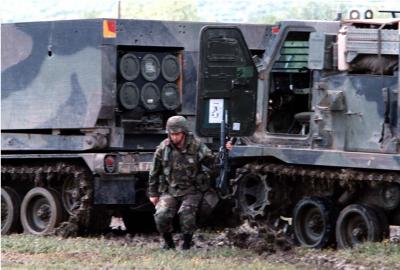 Yugoslavia
Breaks Relations With Albania
Yugoslavia
Breaks Relations With Albania
TIRANA (Reuters) - Yugoslavia severed diplomatic relations with neighboring
Albania Sunday, accusing it of siding with NATO, as the alliance said its
bombing
campaign had broken the back of the Yugoslav air defense system.
Albania dismissed the Yugoslav move as unacceptable and
vowed to continue supporting NATO against what it branded a "criminal
regime" carrying out a
policy of genocide against ethnic Albanians in Serbia's Kosovo province.
As ethnic Albanians continued to flee what NATO calls atrocities
and ethnic cleansing, Western diplomats cited a report that scores
of refugees had been killed by Yugoslav army shelling in Central
Kosovo.
A Skopje-based diplomat said the report had come from a rebel
Kosovo Liberation Army (KLA) commander inside Kosovo who
had provided reliable information in the past.
"As we understand it there are tens of thousands of civilians on the
high ground stretching east from Lapusnik and Orlate. The
commander said as many as 100 people, including some children
have been killed. They're sitting ducks up there."
NATO Brigadier General Giuseppe Marani said he had
photographic evidence of 43 mass graves in Kosovo. Ethnic
Albanians in red-orange uniforms were being forced by Serbs to
bury the corpses of their countrymen, he told a news conference.
NATO said Yugoslavia's air defenses were now only ad hoc and
makeshift. NATO spokesman Jamie Shea said that in one
overnight raid 36 aircraft had destroyed 13 armored vehicles in
Kosovo and destroyed the Pancevo oil refinery near Belgrade.
"(Yugoslav President Slobodan) Milosevic no longer has the
ability to refine crude today," Shea said.
A pall of black smoke hung over the Yugoslav capital after a night
of attacks and a three-year old girl was killed in a raid on
Batajnica military airport to the north of the city, Studio B
television reported.
A Serbian environment ministry official said the strike against the
refinery had created an oil spill stretching for 15 to 20 km (10 to
13 miles) in the Danube River, which was moving toward the
Black Sea.
Undeterred by a bloody incident last Wednesday in which a
column of refugees was allegedly bombed by accident by NATO
planes, the alliance also pressed ahead with air strikes on transport
and communication infrastructure in an attempt to isolate
Milosevic's 40,000 troops and 300 tanks in Kosovo.
On the 25th night of the air war, targets included refineries and
chemical plants in Belgrade and Novi Sad, the site of a military
airport near the capital and the main highway from Belgrade to the
Montenegrin capital Podgorica, according to Serb media.
NATO Secretary-General Javier Solana told BBC television
alliance military leaders were concentrating on defeating Milosevic
in the air. But he did not rule out sending in ground troops, a
subject of growing speculation among Western analysts.
"We are not going to change the policy now...But if the moment
comes that it is necessary, I am sure that the countries who belong
to NATO would be ready to do it," he said.
British Prime Minister Tony Blair took the same line, saying
NATO was keeping all options, including the use of ground
troops, under review.
President Clinton, writing in London's Sunday Times, said
Milosevic could end the crisis immediately by withdrawing his
forces from Kosovo, letting in an international security force and
allowing refugees to return home and enjoy self-rule.
"But if he will not do that, our campaign will continue, shifting the
balance of power against him until we succeed," he said.
"Ultimately, Mr Milosevic must either cut his mounting losses or
lose his ability to maintain his grip on Kosovo."
Another British newspaper, the Observer, said NATO was laying
plans for a ground invasion, perhaps as early as the end of May.
It said 80,000 troops had been earmarked for the operation,
including American soldiers already training in Colorado.
The paper cited the sources as saying the accelerated timetable
followed insistence by NATO's political leaders that the bombing
campaign must be over within three months.
Clinton said Serbia needed a democratic transition, "for the region
cannot be secure with a belligerent tyrant in its midst."
Yugoslavia's neighbors and Western states came under new
pressure to cope with the refugee exodus after a temporary lull
when Yugoslavia closed its borders.
About 28,000 hungry and exhausted refugees have passed
through Albania's main border crossing with Yugoslavia in the 48
hours to mid-Sunday, the largest influx in 10 days. Refugees have
told aid workers 50,000 or more may be following behind.
Relief officials in northern Albania said the latest arrivals -- in
cars,
tractors, trucks and on foot -- were in the worst condition they
had seen.
A car full of refugees hit a landmine near the Morina crossing into
Albania, killing five, Western monitors said.
In Washington, a spokeswoman for U.S. first lady Hillary Rodham
Clinton said she was considering travelling to Albania to get a
first-hand look at humanitarian relief operations.
The U.N refugee agency says over half Kosovo's 1.8 million
people have fled their homes fearing Serb attacks since NATO air
strikes began on March 24. NATO officials say Milosevic may be
trying to drive most of the Albanians from the province.